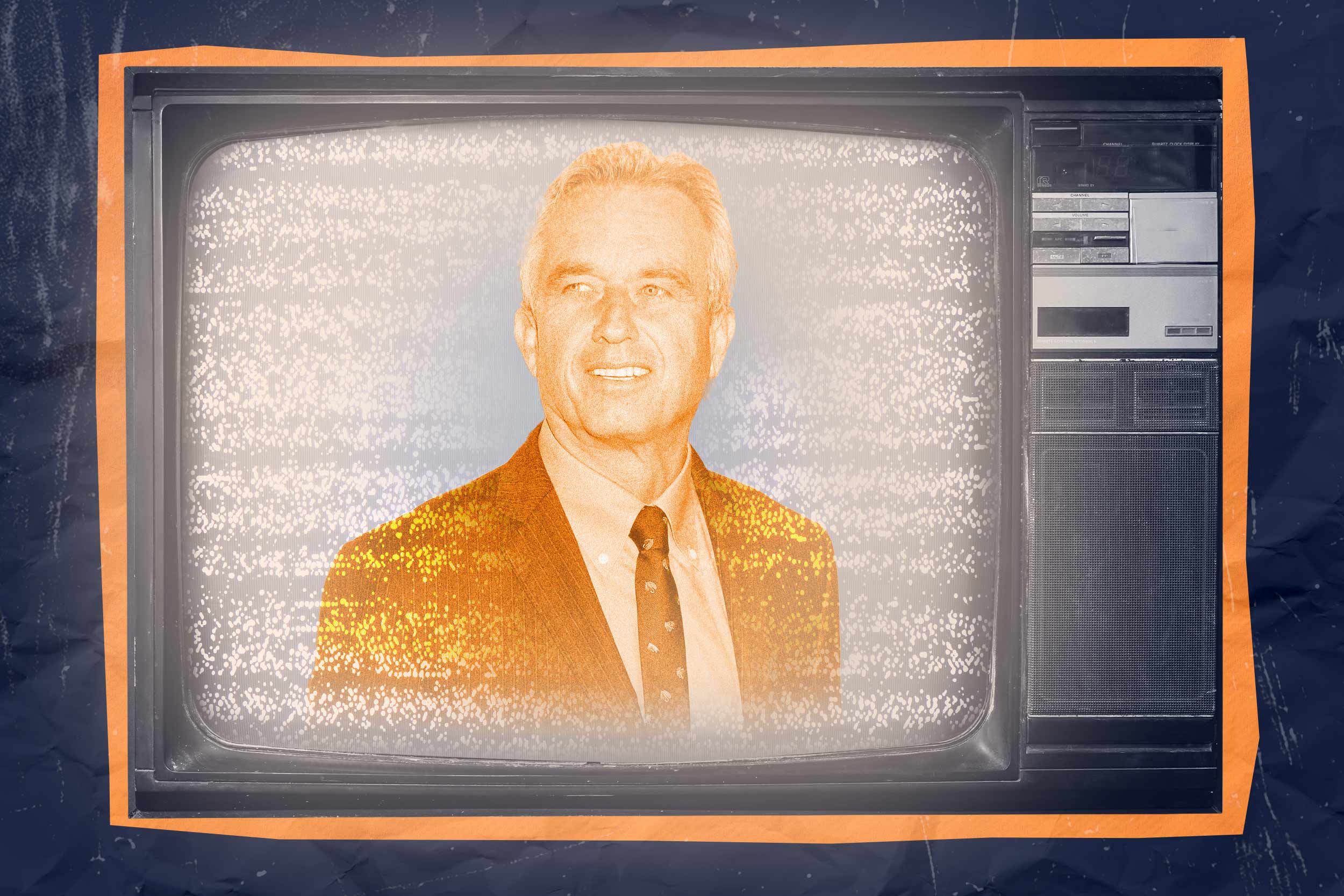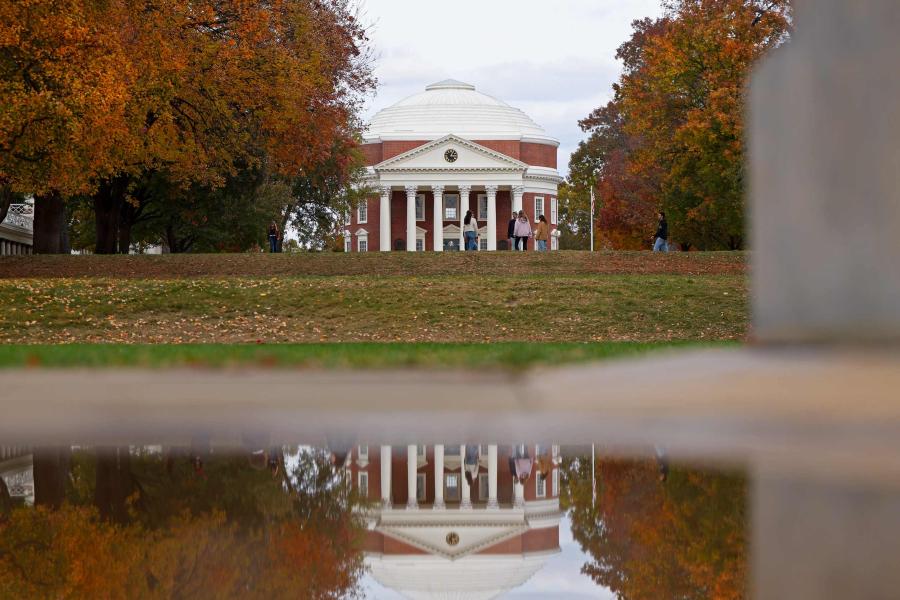A 30-second ad during the Super Bowl for third-party presidential candidate Robert F. Kennedy Jr. presented the politician in a fun and positive light. It was meant to be nostaligic while connecting Kennedy to a storied American political family. (Illustration by John DiJulio, University Communications, and Vecteezy)
$7 Million Ad Does Its Job: Attracting Attention to Kennedy Campaign

A 30-second, $7 million ad, fraught with political nostalgia and aired during the Super Bowl, brought national attention, criticism and elicited an apology from a political candidate to his extended family.
In short, it was successful.
University of Virginia political experts say the spot, created by the American Values Super PAC that backs independent presidential candidate Robert F. Kennedy Jr., a 1982 graduate of the UVA School of Law, was designed to appeal to older Americans and intrigue younger ones curious about its old-school approach.
The ad was a takeoff on a 60-second ad that ran in 1960 in support of President John F. Kennedy, featuring similar graphics and a jingle that repeated the name “Kennedy,” but with Robert F. Kennedy Jr.’s face in place of his famous uncle.
The ad neither accused nor criticized other candidates, but the jingle proclaimed Kennedy as a man “old enough to know and young enough to do,” the same lyrics used in the 1960 ad for JFK.
“It invoked JFK’s legacy, for those of us who knew it was based on his 1960 ad,” said Barbara A. Perry, the Gerald L. Baliles Professor in Presidential Studies at UVA’s Miller Center of Public Affairs, where she co-directs the Presidential Oral History Program. “It evoked a simpler time in American politics: one with black-and-white animated cartoons, catchy jingles and positive messages.”
Our momentum is growing. It’s time for an Independent President to heal the divide in our country. 🇺🇸#Kennedy24 pic.twitter.com/6rwXW3AwAp
— Robert F. Kennedy Jr (@RobertKennedyJr) February 12, 2024
The ad likely was intended to separate Kennedy from President Joe Biden and former President Donald Trump, the leading candidates for their party nominations and Kennedy’s most likely opponents come November’s general election.

Barbara Perry, Gerald L. Baliles Professor in Presidential Studies at UVA’s Miller Center of Public Affairs, says the ad evoked a simpler time in American politics. (Photo by Amber Reichert)
“It’s fun, positive and meant to gin up nostalgia, which is unusual in today’s politics,” said Jennifer Lawless, the Leone Reaves and George W. Spicer Professor of Politics and chair of the UVA Politics Department. “Baby boomers will remember the 1960 Kennedy ad and smile. Younger people who are totally confused about why an ad that looks like it’s 1960 played during the Super Bowl might Google it. And people who might like the idea of voting for a third-party candidate, but worry that those campaigns are typically under-funded, might feel better knowing that the SuperPAC had $7 million to spend on one 30-second spot.”
“It also helped illustrate the main reason why Kennedy is getting some level of support – his last name, which is among the most politically evocative of any in American political history,” said Kyle Kondik, editor of Sabato’s Crystal Ball, a newsletter of the UVA Center for Politics. “He is benefiting from a family political legacy that he himself has contributed very little to.”

Jennifer Lawless, Leone Reaves and George W. Spicer Professor of Politics and chair of the Politics Department, said the ad’s $7 million pricetag might ease some fear for people supporting third-party candidates who worry that campaigns are often under-funded. (Photo by Dan Addison, University Communications)
The ad supposedly was created without direct involvement from Kennedy or his campaign staff, a claim Kennedy made in his apology to family posted on his social media account in X, formerly known as Twitter. The airing of the ad drew sharp criticism from some of his family members, who complained that RFK Jr.’s values were far different from his late uncle’s.
“It’s important, logistically, to note that this ad was paid for by a Super PAC, not Kennedy’s actual campaign. By law, the candidate and the Super PAC are not supposed to coordinate,” Kondik said. “However, RFK Jr. has the ad as a pinned tweet on his Twitter/X account, so he’s certainly sharing it, even as he simultaneously offered something of an apology for the ad on the same platform.”
“SuperPACs cannot coordinate with a candidate’s campaign. In fact, the Kennedy campaign is already taking heat about seeming coordination when it comes to ballot access. So it’s completely possible – indeed, it’s required – that RFK Jr. did not know about the ad,” Lawless said.
I'm so sorry if the Super Bowl advertisement caused anyone in my family pain. The ad was created and aired by the American Values Super PAC without any involvement or approval from my campaign. FEC rules prohibit Super PACs from consulting with me or my staff. I love you all. God…
— Robert F. Kennedy Jr (@RobertKennedyJr) February 12, 2024
Robert F. Kennedy Jr. has long been controversial. For years he has been anti-vaccine, claiming vaccines were connected to autism. He opposed COVID vaccines and said he believes the SARS-CoV-2 virus that causes COVID-19 was genetically engineered to attack white and Black people.
He has claimed school shootings are linked to prescription drugs; the 2004 presidential election was stolen; and Sirhan Sirhan did not kill his father, Robert F. Kennedy Sr. His positions on those and numerous political issues have created a rift between him and family members.

Kyle Kondik, editor of Sabato’s Crystal Ball, a newsletter of the UVA Center for Politics, said RFK Jr. is benefiting from the Kennedy family legacy with the ad, a legacy to which has contributed “very little.” (Contributed photo)
Perry said it seems unlikely Kennedy would have been totally in the dark about the ad, although he legally could not be directly involved.
“Regardless, he did owe his family an apology for misappropriating his uncle’s imagery and symbolism as the young leader of the nation on the New Frontier,” she said. “Especially because his own siblings and cousin have critiqued and distanced themselves from his current campaign and his comments over the past two decades.”
Perry said the ad may have boosted RFK Jr.’s image among some Americans.
“I bet some Americans who still long for the restoration of the tragically truncated ‘Camelot’ era of President Kennedy’s administration felt a pang of nostalgia from the recycled JFK ad,” Perry said. “The Kennedy surname is not as golden as it used to be, but the only reason RFK Jr. is drawing the level of support he does is because of it.”
Media Contacts
Assistant Editor, UVA Today Office of University Communications
bkm4s@virginia.edu 434-924-3778




